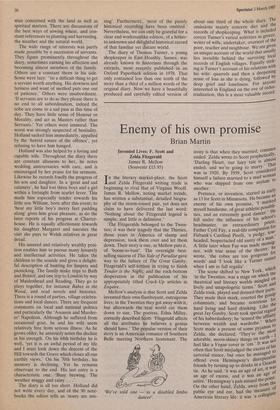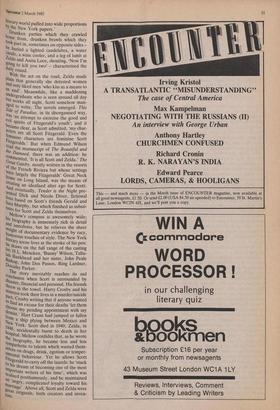Enemy of his own promise
Brian Martin
Invented Lives: F. Scott and Zelda Fitzgerald James R. Mellow (Souvenir 15.95) I n the literary market-place, the Scott and Zelda Fitzgerald writing trade is beginning to rival that of Virginia Woolf. James R. Mellow, noting market trends, has written a substantial, detailed biogra- phy of the storm-tossed pair, yet does not claim to have delivered the last word: 'Nothing about the Fitzgerald legend is simple, and little is definitive.' The Fitzgeralds belonged to the Twen- ties; it was their tragedy that the Thirties, those years in America of slump and depression, took them over and let them down. Their story is one, as Mellow puts it, of 'boom-to-bust'. The overnight best- selling success of This Side of Paradise gave way to the failure of The Great Gatsby, Fitzgerald's self-torture in trying to finish Tender is the Night, and the rock-bottom desperation in the publication of his appropriately titled Crack-Up articles in Esquire. Mellow's analysis is that Scott and Zelda invented their own flamboyant, outrageous lives; in the Twenties they got away with it, but afterwards the real world cut them down to size. The poetess, Edna Millay, correctly described Scott: 'Fitzgerald affects all the attributes he believes a genius should have.' The popular version of their story is an American romance of Southern Belle meeting Northern lieutenant. The 'We've sold one — to a disabled limbo dancer'. irony is that when they married, romance ended. Zelda wrote to Scott prophetically, 'Darling Heart, our fairy tale is almost ended, and we're going to marry.' That was in 1920. By 1939, Scott considered himself a failure married to a mad waffina who was shipped from one asylum to another. Pretence, or invention, started as early as 13 for Scott in Minnesota. He became an enemy of his own promise, I marked myself handsome, of great athletic possibli- ties, and an extremely good dancer.' 14,e fell under the influence of his school s headmaster, an extraordinary Priest' Father Cyril Fay, a real-life companion for : Firbank's Cardinal Pirelli, 'a pudgy, tow headed, bespectacled old aunty of a mall • A little later when Fay was made monsi r nor, with true sense of the theatre, he wrote, 'the robes are too gorgeous for words' and 'I look like a Turner sunset when I am in full regalia'. The scene shifted to New York, which 'in the Twenties, was a stage on whi ch the theatrical and literary worlds mingled an lively and unapologetic terms.' Scott and Zelda took, played and dressed their parts: They made their mark, courted the gassIP columnists, and became notorious for hard living and hard drinking. Like the great Jay Gatsby, Scott took special rep', of his haberdashery; he 'sensed the affinity between wealth and wardrobe.'Wheil Scott made a present of some pYianlas m Zelda, she declared, 'They're the inns; adorable, moon-shiney things on earth feel like a Vogue cover in 'em.' It Was o?' often that Scott misjudged the excess alas sartorial stance, but once he managed to offend even Hemingway's disreputable friends by turning up to drinks in a Guards tie. As he said, 'it was an age of art, It was anage of excess, and it was an age. satire.' Hemingway's pals missed the paint' On the other hand, Zelda, away from the of eye and ear, had the measure. al American literary life: it was 'a collegiate
literary world puffed into wide proportions bY the New York papers.' Drunken parties which they crawled home from, drunken brawls which they took part in, sometimes on opposite sides – he hurled a lighted candelabra, a water carafe, a wine cooler, and a leg of lamb at Zelda and Anita Loos, shouting, 'Now I'm going to kill you two' – characterised the daily round.
With the act on the road, Zelda made Plain that generally she detested women and only liked men 'who kiss as a means to an end'. Meanwhile, like a maddening undergraduate who is seen around all day but works all night, Scott somehow man- aged to write. The novels emerged. This Side of Paradise, in its disorganised way, WaS an attempt to exorcise the good andil Spirits of Fitzgerald's youth'; and it uPeeame clear, as Scott admitted, 'my char- ,acters are all Scott Fitzgerald. Even the
,tenninine characters are feminine Scott
ritzgeralds.' But when Edmund Wilson read the manuscript of The Beautiful and the Damned, there was an addition: he e13inmented, 'It is all Scott and Zelda.' The Great Gatsby, mostly written in the resorts (3f the French Riviera but whose settings w, ere largely the Fitzgeralds' Great Neck 'Ionic on Long Island, was the means of creating an idealised alter ego for Scott. And eventually, Tender is the Night pre- s.ented Dick and Nicole Diver, fictional I,!ves based on Scott's friends Gerald and ,ara Murphy, but which finished as substi- Mes for Scott and Zelda themselves.
his compass is awesomely wide; s biography is immensely rich in detail andanecdotes, but he relieves the sheer eight of documentary evidence by racy, :!tifflorous touches of style. The New York 1,1terary scene lives at the stroke of his pen: ine draws on the full range of the casting H.L. Mencken, 'Bunny' Wilson, Tallu- 6an Bankhead and her sister, John Peale bisb°13. John Dos Passos, Ring Lardner, orothy Parker. The story inevitably reaches its sad c_,?nelusion when Scott is surrounded by linsaster, financial and personal. His friends brew in the towel. Harry Crosby and his nfistress took their lives in a murder/suicide 1?act, Crosby writing that if anyone wanted "3
el find an excuse for their deaths let them nos fuentist.' e my pending appointment with my
Hart Crane had jumped or fallen ,r 'in a ship plying between Mexico and "i„ew York. Scott died in 1940; Zelda, in C48, accidentally burnt to death in her th°sPital. Mellow confides that, as he wrote L'e biography, he became less and less sYMPathetic to talents which wasted them- selves on drugs, drink, egotism or temper- 4,1n. ental behaviour. Yet he allows Scott Irzgerald to carry off the laurels: he 'stuck his dream of becoming one of the most IrnPortant writers of his time', which was realised posthumously, and he maintained an 'angry, complicated loyalty toward his marriage'. Above all, Scott and Zelda were great originals, both creators and inven- tors.















































 Previous page
Previous page